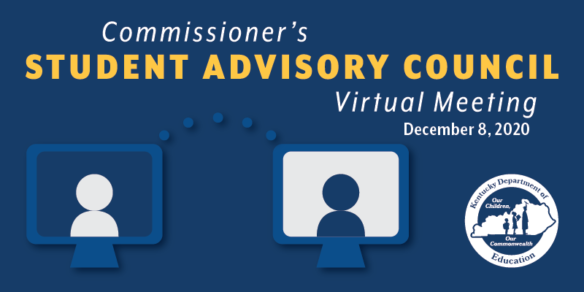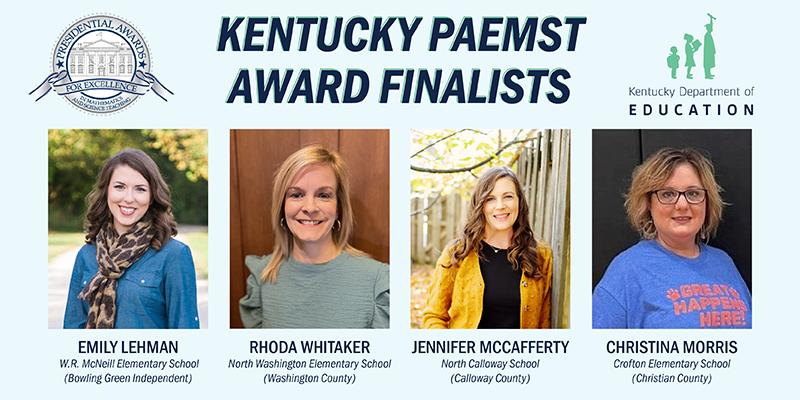
- Most SAC members urge delay after Jan. 4, but want local districts to decide then.
- Equity discussions difficult but necessary, students say.
By Jim Gaines
jim.gaines@education.ky.gov
Opinions are mixed among members of the Kentucky Department of Education (KDE) Commissioner’s Student Advisory Council (SAC) on whether Kentucky schools should be allowed to resume in-person classes in January, and on who should make that decision.
Commissioner of Education Jason E. Glass asked SAC members their opinions during a Dec. 8 regular meeting.
In response to a major surge in positive COVID-19 test rates, hospital occupancy and deaths, Gov. Andy Beshear suspended in-person classes in public and private schools by executive order from Nov. 23 until Dec. 7 for grades K-5, and for grades 6-12 until Jan. 4.
Grades 6-12 will not be allowed back in schools until Jan. 4, but grades K-5 may return Dec. 7 provided they are no longer in a “red zone county” as defined by the Kentucky Department of Public Health (DPH), and continue using Healthy at School guidance.
State-level debate is ongoing as to when or whether in-person classes should resume in January, Glass said. That decision will be based largely on the incidence of COVID-19 at the time, but Gov. Beshear is also seeking stakeholders’ opinions, Glass said.
“Those discussions are happening right now,” he said.
If infection rates haven’t declined from their current level by Jan. 4, sending students back to school would only worsen the situation, said council member Sam Smith, a senior at Daviess County High School.
Prior to the shutdown, Daviess County Public Schools had returned to hybrid classes, with some students in school and other continuing to use non-traditional instruction (NTI), he said.
About 30 seniors who were doing poorly on NTI returned to Daviess County classrooms, showing there is more than one way to structure classes than all-in or all-out, Smith said.
In Breathitt County there were no major COVID-19 outbreaks, but as rates rose in general, more students were under quarantine and more students were under stress, said council member Caleb Bates, a senior at Breathitt County High School.
“It’s hard to balance education and public health,” he said. But for now public health should take precedence, keeping students on NTI until infection rates drop, Bates said.
Council member Jack Johnson, a sophomore at Marshall County High School, said a friend’s brother in 1st grade was quickly learning to read in class but regressed on NTI. In-person classes are needed to teach basic skills to younger students, he said.
Another factor is the psychological strain on homebound students, Johnson said. Without social interaction at school, many of his friends visit each other anyway, potentially negating the value of keeping students out of class, he said.
Johnson said the decision on returning to classes should be left to local communities and school districts.
A delay until mid-January would be good, but then the decision should be a local one, said council member Rohin Dutt, a junior at duPont Manual High School (Jefferson County).
Council member Lohith Tummala, a junior at Paul Laurence Dunbar High School (Fayette County), agreed the choice should rest with local health departments because infection rates differ so widely between counties.
Laila Hayes, a senior at duPont Manual High School, said students should remain out of class until COVID-19 rates fall. No one wants to be responsible for a decision that could lead to a student’s death, she said.
Opening to in-person classes should be delayed, said council member Gavin Bruenig, a sophomore at Elizabethtown High School (Elizabethtown Independent), but the eventual decision should be left to local districts, with parents choosing whether individual students attend.
Council member Miles McGinnis, a senior at South Oldham High School (Oldham County), said reopening should be delayed until the end of January to gauge the effect of travel and gatherings over the holidays.
Until students do come back, schools need to find ways to better support students who have educational barriers such as disabilities, said council member Renuka Gentela, a senior at Paul Laurence Dunbar High School.
Returning to classes quickly risks not just students but school staff and teachers who may have health conditions that put them at high risk, said council member Soleila Elliot Gonzalez, a sophomore at Ballard High School (Jefferson County). She would urge Gov. Beshear to order a lockdown from the New Year until mid-February and re-examine infection rates then.
Gracie Smith, a Hardin County sophomore who attends the Kentucky School for the Blind in Jefferson County, said the choice is harder at the state’s specialty schools, where many students have other health issues. At those, the decision should rest with individual parents, she said.

Members of the Kentucky Department of Education’s Commissioner’s Student Advisory Council discuss when they think school should resume at their Dec. 8 meeting.
Screen shot by Toni Konz Tatman
Equity in Education
As part of gauging KDE’s efforts toward equity and inclusion, Thomas Woods-Tucker, KDE chief equity officer and deputy commissioner for the Office of Teaching and Learning, asked council members what could be done to make students and staff feel more accepted.
Council member Anna Williams, a senior at Anderson County High School, said she liked Woods-Tucker’s goal of the racial breakdown of teachers matching a school’s overall demographics. She hasn’t had that experience herself, she said.
Viviana Heredia, a senior, said it can be hard to start conversations about equity and inclusion, so she started a club at Ryle High School (Boone County) to create a safe space for discussion.
Dutt said his English teacher holds in-class discussions about equity, allowing people to speak freely in small groups with others they’re comfortable with.
Such discussions are particularly needed in communities that aren’t very diverse, Woods-Tucker said. Educators have an obligation to prepare those students for life and success in more diverse communities elsewhere, he said.
Assessment Questions
Another open question is how or whether Kentucky will administer student assessments this year, Glass said.
“States are required to administer assessments because we take federal money,” Glass said.
States received a federal waiver for the 2019-2020 school year to not give assessments due to the impact of the pandemic, but there seems to be little appetite from the U. S. Department of Education for a wholesale exemption from assessments for the current school year, he said.
States were told in September they should prepare to administer assessments, but much has changed since then – including the expectation of a new U.S. Secretary of Education under the incoming administration of president-elect Joe Biden, Glass said.
Kentucky has prepared a shorter-than-usual assessment which may be administered in the spring, Glass said. It won’t be used to assign a star rating for schools and districts and its timing is flexible, he said.
The assessment could be given statewide, only in districts holding in-person classes, or – if a federal waiver is issued – not given at all, Glass said.
Resilience Discussion
Damien Sweeney, program coordinator for comprehensive school counseling in the KDE Office of Teaching and Learning, talked about the impact of extended NTI on mental health. He led council members through several techniques for developing mental and emotional resilience.
A recent survey found that 61% of all teenagers are feeling extreme loneliness during the COVID-19 pandemic, Sweeney said.



Leave A Comment